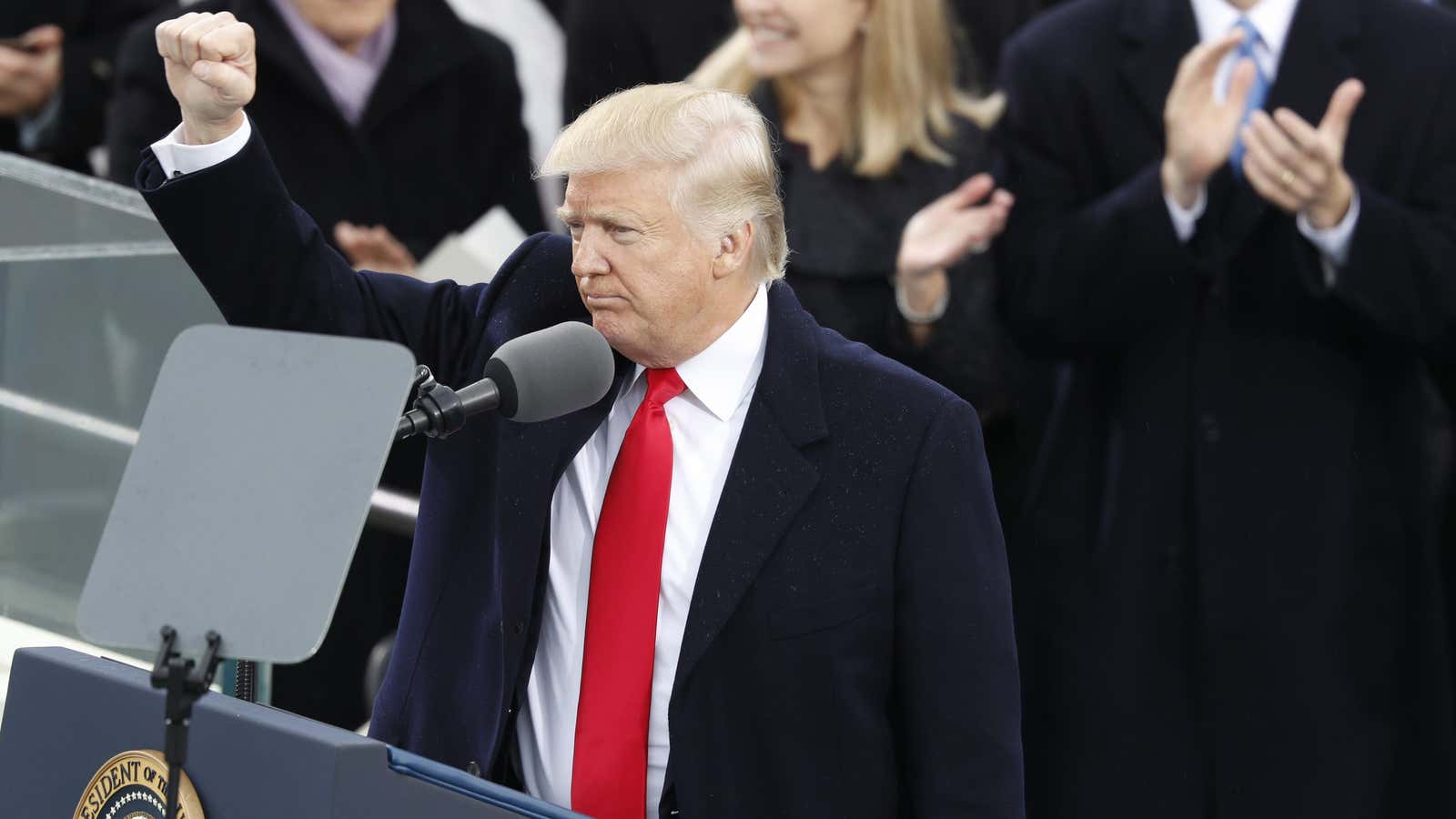If for some reason Donald Trump’s stormy inauguration speech didn’t convince you that the US is abdicating from its global leadership role, perhaps the newly-published “America First Foreign Policy” manifesto will. Published minutes after the inauguration on the revamped www.whitehouse.org, the first line reads: “The Trump Administration is committed to a foreign policy focused on American interests and American national security.”
It’s a far cry from Jimmy Carter’s “foreign policy of human rights,” George W. Bush’s democracy promotion or Barack Obama’s cautious pragmatism. Where other presidents have focused on bringing international harmony through either better trade relations, support for civil society institutions, or bolstering international institutions, Trump’s credo is “peace through strength.”
The slogan ”America First” itself is highly divisive—in its first iteration, it was a rallying cry for anti-semitic groups campaigning to stop the US fighting in World War II. The Anti-Defamation League, started in 1913 to combat anti-semitism, urged Trump to stop using it in April last year.
Here are the four ways Trump plans to deliver on the policy:
Beating ISIL and other “radical Islamic terror groups”
At a time when the US has been under literal attacks from another country in the cyber realm, beating Islamic terrorism will be the Trump administration’s “highest priority,” implying that terrorism is the greatest threat to the country. This section does, coincidentally, contain the document’s only reference to cyber warfare—but in the context of nullifying terrorist groups’ propaganda and recruitment networks.
A massive military spending program
“Our military dominance must be unquestioned,” the manifesto asserts, noting that the size of the US Navy and Air Force have shrunk since 1991. Given that America’s defense budget is bigger than the next 10 countries combined, this would seem a pretty moot point—but it’s a big populist crowdpleaser from the new strongman president. The size of the Air Force and Navy are perhaps odd examples to pick, however, since warfare has changed considerably in recent decades, moving toward “nonlinear war” from old-fashioned big battles, and privileging the ability to rapidly respond to military provocations and being able to weaponize information.
Reoriented diplomacy
“The world must know that we do not go abroad in search of enemies, that we are always happy when old enemies become friends, and when old friends become allies,” the manifesto reads.
This sentence more than anything encapsulates how the world order could change under Trump. “Old enemies” becoming friends is a clear olive branch to Russia, while support for current allies (whom he hasn’t shied away from disparaging) is notably absent. Trump has long said he thinks America is being ripped off in the current alliances like NATO that define the global order, and favors a new deal-making approach where he can see tangible benefits from relations with countries, like Russia.
Redefining global trade
The second half of the manifesto retreads Trump’s oft-repeated trade priorities, with the message being that global trade must benefit the American worker. It’s a radically statist approach to an issue seen by recent presidents as benefiting the entire world economy and helping create peaceful bilateral relations. The memo’s language confirms that; there’s not a single sentence about how trade deals affect relations with other countries or subtle global power balances. Instead, the new administration says it will take a zero-sum approach—with every negotiation starting from the basis of how American workers will be helped.
The president is “committed to renegotiating NAFTA,” its says. “If our partners refuse a renegotiation that gives American workers a fair deal, then the President will give notice of the United States’ intent to withdraw from NAFTA.” While China isn’t mentioned directly, expect a Cold War-era approach to relations with the world’s other superpower.
Leader of the free world no more
In sum, the warm, fuzzy conceit of America, the well-meaning, oft-blundering global super-cop trying to spread democracy has officially disappeared. Today’s foreign policy announcements reveal an administration that sees international relations as a dog-eat-dog realm. As Trump argued in his inauguration speech, “it is the right of all nations to put their own interests first. We do not seek to impose our way of life on anyone but rather to let it shine as an example.” That example? Pure self-interest.
